Recently, I have realized how much Spaniards value their time eating and drinking together. I wanted to shed light on how each meal is like a different occasion. Lunch, dinner, breakfast, and the small meals in between, are all times to indulge, converse, and enjoy each others company.
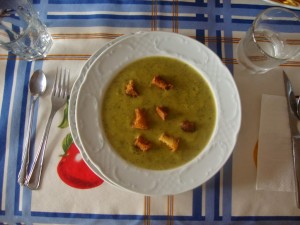
First, the most important meal of the day in Granada is lunch, which occurs around 2-4 p.m. It is the heaviest meal in Spain and is the time when family and friends can talk about their day. Living with a host family, I have grown accustomed to waiting until lunch to discuss the depths of my day. Every time I eat lunch with my host family, we tell stories, laugh, and oftentimes, have deep, intimate talks. Whenever I'm having a great day, I share it during lunch. And on the other hand, when I'm having a rough day, I bring that to the table, too, and we end up working it out through our conversations. Along with the benefits of living with a host family and getting to experience the intimate conversations, I also get to experience these artful presentations:
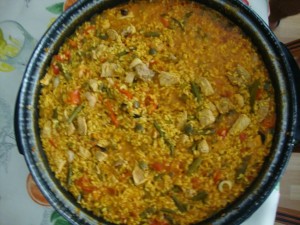
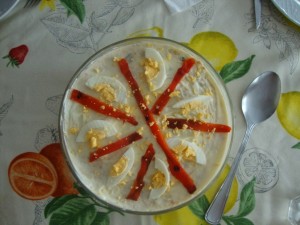
After touching on the biggest meal of the day-- lunch-- I want to touch on how the simplest meals in Granada are just as important as the biggest meal...
The act of eating tapas together is a valued time in Granada. Going out for tapas is more common at night, oftentimes in replacement of dinner, or you can go out after noon, as well.
Last Monday, the last day of my Intensive Language course, my classmates and I went out for churros and chocolate with our professors, and then dined on tapas after. Tapas are shared appetizers, and the act of sharing a plate with three or four other people is intimate and heartwarming. Rather than talking about solely schoolwork, we told stories of our travel experiences and other experiences in Granada. It was a time for us to open up more with each other, which is often limited in a classroom setting. Going out for tapas is a time to socialize and enjoy the company you have while dining on something light. It's also a time to catch up and tell stories, which makes this small meal special and distinct in its own way.
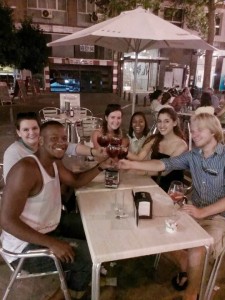
Sitting down and having a cup of coffee is also a cherished time in Granada. In Chicago, for example, it is normal up to the point of being cultural that people drink coffee on-the-go. The difference in Spain is that Spaniards like to cherish their time with whoever they are drinking coffee with, and they like to indulge in the aestheticism of imbibing. Sitting outside a cafe and drinking coffee, maybe with a Spanish tostada or croissant, is a time to relax-- the total opposite of the hustle-bustle lifestyle of Chicago, where mornings begin on the run. There's no set time of when to have a cup of coffee or a tostada, but Spaniards usually have a cup of coffee or a pastry in between breakfast and lunch, or before dinner.
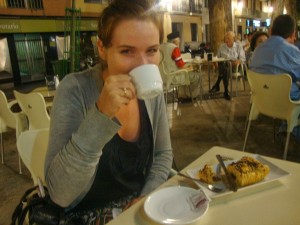
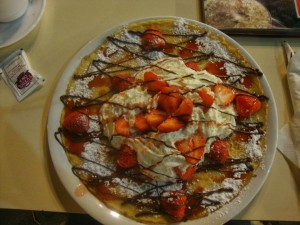
The second biggest meal in Granada is dinner, which usually occurs from 8-11 p.m. Dinner is a lighter meal than lunch, and usually consists of sausages, pisto (a vegetable stew), and other lighter portioned meals. With my host family, dinners usually are independent meals, and we don't necessarily have to be together in the house to eat. We have different work and class schedules, so dinner is typically a solo meal. However, you could substitute dinner for tapas, because some tapas bars offer bigger portioned tapas. After attending El Dia de La Virgen de Las Angustias (a religious event in Granada), I had tapas with my host mom and her friends. We had tapas for our dinner, which was fine because dinner tends to be pretty light when compared to lunch.
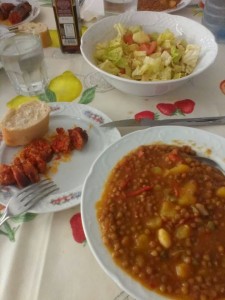
Stephanie Khio is the Fall 2013 CEA MOJO in Granada, Spain. She is currently a senior at Roosevelt University in Chicago.

First, the most important meal of the day in Granada is lunch, which occurs around 2-4 p.m. It is the heaviest meal in Spain and is the time when family and friends can talk about their day. Living with a host family, I have grown accustomed to waiting until lunch to discuss the depths of my day. Every time I eat lunch with my host family, we tell stories, laugh, and oftentimes, have deep, intimate talks. Whenever I'm having a great day, I share it during lunch. And on the other hand, when I'm having a rough day, I bring that to the table, too, and we end up working it out through our conversations. Along with the benefits of living with a host family and getting to experience the intimate conversations, I also get to experience these artful presentations:


After touching on the biggest meal of the day-- lunch-- I want to touch on how the simplest meals in Granada are just as important as the biggest meal...
The act of eating tapas together is a valued time in Granada. Going out for tapas is more common at night, oftentimes in replacement of dinner, or you can go out after noon, as well.
Last Monday, the last day of my Intensive Language course, my classmates and I went out for churros and chocolate with our professors, and then dined on tapas after. Tapas are shared appetizers, and the act of sharing a plate with three or four other people is intimate and heartwarming. Rather than talking about solely schoolwork, we told stories of our travel experiences and other experiences in Granada. It was a time for us to open up more with each other, which is often limited in a classroom setting. Going out for tapas is a time to socialize and enjoy the company you have while dining on something light. It's also a time to catch up and tell stories, which makes this small meal special and distinct in its own way.

Sitting down and having a cup of coffee is also a cherished time in Granada. In Chicago, for example, it is normal up to the point of being cultural that people drink coffee on-the-go. The difference in Spain is that Spaniards like to cherish their time with whoever they are drinking coffee with, and they like to indulge in the aestheticism of imbibing. Sitting outside a cafe and drinking coffee, maybe with a Spanish tostada or croissant, is a time to relax-- the total opposite of the hustle-bustle lifestyle of Chicago, where mornings begin on the run. There's no set time of when to have a cup of coffee or a tostada, but Spaniards usually have a cup of coffee or a pastry in between breakfast and lunch, or before dinner.


The second biggest meal in Granada is dinner, which usually occurs from 8-11 p.m. Dinner is a lighter meal than lunch, and usually consists of sausages, pisto (a vegetable stew), and other lighter portioned meals. With my host family, dinners usually are independent meals, and we don't necessarily have to be together in the house to eat. We have different work and class schedules, so dinner is typically a solo meal. However, you could substitute dinner for tapas, because some tapas bars offer bigger portioned tapas. After attending El Dia de La Virgen de Las Angustias (a religious event in Granada), I had tapas with my host mom and her friends. We had tapas for our dinner, which was fine because dinner tends to be pretty light when compared to lunch.

Stephanie Khio is the Fall 2013 CEA MOJO in Granada, Spain. She is currently a senior at Roosevelt University in Chicago.







